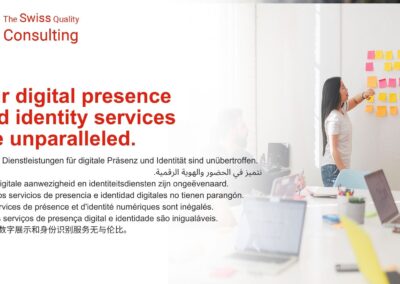Harnessing AI for Personalized Wealth Management Solutions
The Emergence of AI in Wealth Management
The role of AI in enhancing wealth management services is becoming increasingly prominent, particularly with the rise of robo-advisors like Betterment and Wealthfront that provide personalized investment advice. In regions like Saudi Arabia and the UAE, the adoption of AI in financial services is transforming the landscape of wealth management. By leveraging advanced algorithms and machine learning, AI-driven platforms offer tailored investment strategies that cater to individual financial goals and risk appetites.
In Saudi Arabia, the integration of AI in wealth management is aligned with the country’s Vision 2030 initiative, which aims to diversify the economy and promote innovation. Financial institutions are increasingly adopting robo-advisors to provide clients with personalized investment recommendations based on real-time data analysis. These AI-driven platforms can assess market conditions, predict trends, and adjust investment portfolios dynamically, ensuring optimal returns for investors.
Similarly, in the UAE, the financial sector is witnessing a surge in the adoption of AI for wealth management. The Dubai International Financial Centre (DIFC) is at the forefront of this transformation, fostering an ecosystem that supports fintech innovation. Robo-advisors in the UAE utilize AI to analyze vast amounts of financial data, offering customized investment solutions that enhance portfolio performance. This shift towards AI-driven wealth management not only improves efficiency but also democratizes access to sophisticated investment advice for a broader audience.
Benefits of AI-Driven Wealth Management
The implementation of AI in wealth management services offers several key benefits, making it an attractive option for both financial institutions and clients. One of the primary advantages is the ability to provide highly personalized investment advice. Traditional wealth management services often rely on generic strategies that may not align with individual investor needs. In contrast, AI-driven platforms can tailor investment plans based on a comprehensive analysis of personal financial data, risk tolerance, and market conditions.
Another significant benefit is enhanced efficiency and accuracy. AI algorithms can process and analyze large volumes of data much faster than human advisors, identifying patterns and opportunities that may otherwise be overlooked. This capability enables robo-advisors to make informed investment decisions and adjust portfolios in real-time, maximizing returns and minimizing risks. For business executives and entrepreneurs in fast-paced cities like Riyadh and Dubai, this level of precision and responsiveness is invaluable.
Moreover, AI-driven wealth management promotes transparency and accountability. By using algorithms to make investment decisions, the process becomes more objective and data-driven, reducing the potential for human bias. Clients can access detailed reports and insights into how their portfolios are managed, fostering trust and confidence in the service. This transparency is particularly important in the context of regulatory compliance, as financial institutions in Saudi Arabia and the UAE must adhere to stringent regulations to ensure the integrity of their operations.
The Future of Wealth Management: Integrating AI with Blockchain and the Metaverse
The future of wealth management lies in the integration of AI with other advanced technologies such as blockchain and the metaverse. Blockchain technology, with its inherent transparency and security, can complement AI by providing a secure and immutable record of transactions. This integration can enhance the accuracy and reliability of wealth management services, ensuring that all investment activities are recorded and monitored effectively.
In the context of Saudi Arabia and the UAE, the convergence of AI and blockchain is particularly relevant. Both nations are investing heavily in blockchain technology as part of their broader digital transformation initiatives. By combining AI’s analytical capabilities with blockchain’s secure infrastructure, financial institutions can create a more robust wealth management framework that addresses the complexities of modern financial markets.
The metaverse, an emerging digital frontier, also holds potential for transforming wealth management services. As financial interactions increasingly take place in virtual environments, AI can play a crucial role in providing personalized investment advice and managing digital assets. The metaverse offers new opportunities for financial innovation, but it also presents unique challenges for wealth management. By leveraging AI, financial institutions can navigate these challenges effectively, ensuring that virtual investments are as secure and profitable as those in the physical world.
Leadership and Management in Implementing AI-Driven Wealth Management
Effective leadership and management are crucial for the successful implementation of AI-driven wealth management services. Leaders in the financial sector must be proactive in adopting and integrating new technologies into their wealth management frameworks. This involves not only investing in advanced AI systems but also fostering a culture of innovation and continuous improvement within their organizations.
In Saudi Arabia and the UAE, regulatory bodies play a crucial role in supporting the adoption of AI in wealth management. Leaders in the financial industry must collaborate closely with these regulatory bodies to ensure compliance and leverage available resources. This collaborative approach can facilitate the smooth integration of AI technologies and ensure that they are used effectively to enhance wealth management services.
Moreover, effective project management is essential for the successful deployment of AI-driven wealth management solutions. This includes careful planning, resource allocation, and risk management. By adopting best practices in project management, financial institutions can ensure that AI systems are implemented efficiently and effectively, minimizing disruptions to existing operations and maximizing the benefits of AI for wealth management.
Conclusion: Embracing the Future of Wealth Management
The use of AI in wealth management services represents a significant advancement in the financial industry. In regions like Saudi Arabia and the UAE, where technological innovation is a key priority, the adoption of AI-driven wealth management solutions aligns with broader economic and regulatory goals. By integrating AI with other advanced technologies such as blockchain and the metaverse, financial institutions can create a more robust and effective wealth management framework that meets the challenges of the modern financial landscape.
Effective leadership and management are crucial for the successful implementation of AI in wealth management. By fostering a culture of innovation, collaborating with regulatory bodies, and adopting best practices in project management, financial institutions can harness the full potential of AI to enhance their wealth management services. As we move towards a future where digital transactions and virtual investments are the norm, embracing these advancements will be key to achieving business success and delivering exceptional financial services.
—
#AIinWealthManagement, #RoboAdvisors, #PersonalizedInvestment, #ArtificialIntelligence, #Blockchain, #TheMetaverse, #GenerativeAI, #BusinessSuccess, #LeadershipSkills, #ProjectManagement























